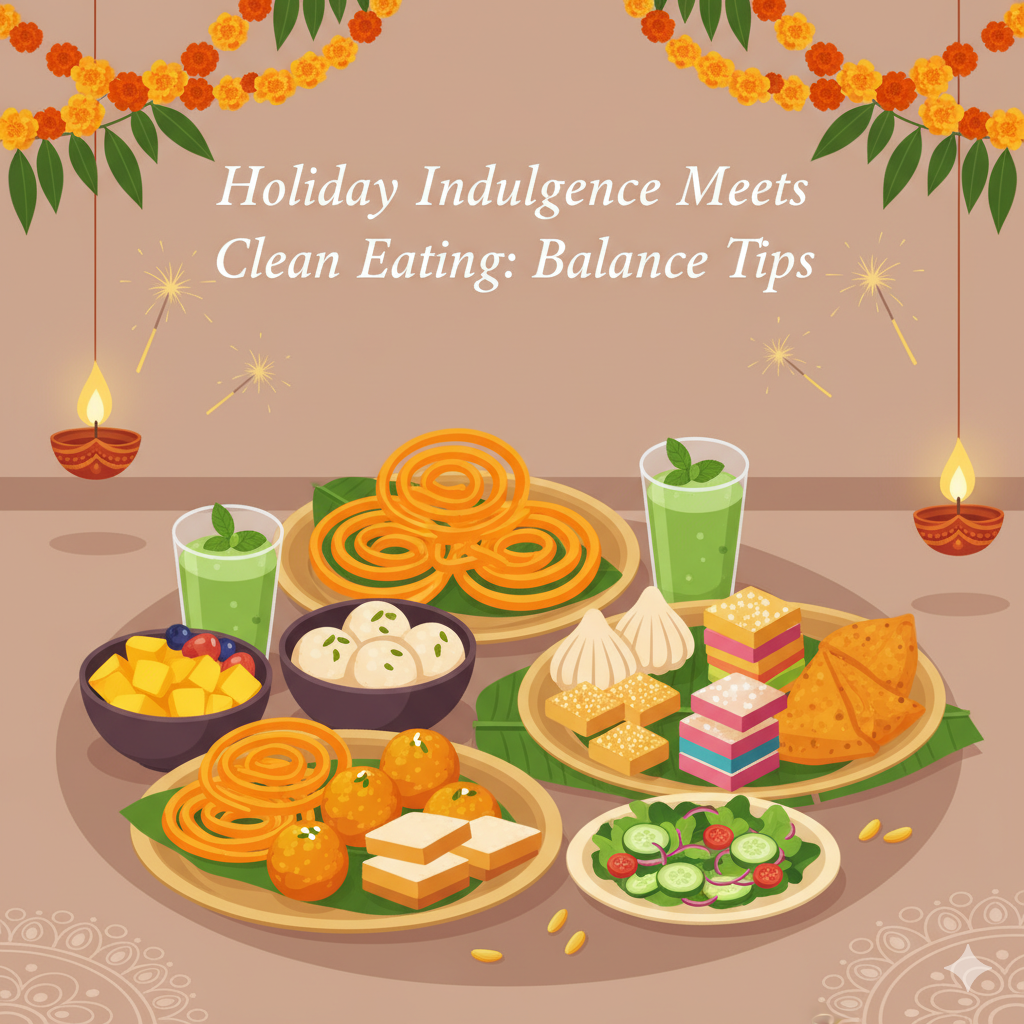It's Diwali week. Your neighbor just sent over a box of kaju katli. Your mom made gajar ka halwa. Office parties have samosas everywhere. And your cousin's wedding has a five-course meal lined up.
Sound familiar?
If you're trying to eat healthy in India, festivals and celebrations are your biggest challenge. We don't just have one or two holidays—we have a festival practically every month, plus weddings, family functions, and those "aaj toh cheat day hai" Sundays.
Let's figure out how to enjoy all of it without feeling guilty or undoing months of progress.
The Indian Festival Weight Reality
Let's start with some honesty.
According to fitness and health surveys conducted across Indian metros, the average Indian gains 2-5 kg during the festive season (October to January). That's Diwali, Dussehra, Karva Chauth, Christmas, New Year, and everything in between.
Here's what makes it worse: A study published in the Indian Journal of Endocrinology found that 68% of Indians don't lose this festival weight in the following months. It just... stays. Year after year, those kilos pile up.
Why? Because Indian celebrations are built around food. It's not just about eating—it's about love, tradition, and family. Refusing your dadi's ladoos feels like rejecting her affection. Not eating at a wedding? "Kya hua, tabiyat kharab hai?"
But here's the good news: You don't have to choose between health and happiness. You can have both.
The Mindset Shift: Balance, Not Perfection
First, throw away the "all or nothing" thinking.
You're not "good" on clean eating days and "bad" on festival days. Food is not a moral issue. One plate of biryani at your friend's wedding won't ruin your health, just like one salad won't transform it.
The goal isn't perfection. The goal is balance.
Think of your eating like a bank account. Most days, you make healthy deposits. Festival days? You withdraw a bit. As long as you're not withdrawing every single day, your account stays healthy.
Before the Celebration: Set Yourself Up for Success
1. Don't Starve Yourself
The biggest mistake? Skipping breakfast and lunch to "save calories" for the party.
This backfires spectacularly. You arrive ravenous, lose all control, and eat everything in sight. Then you feel sick, guilty, and bloated.
Instead: Eat a normal, protein-rich breakfast and a light lunch. You'll arrive satisfied, not starving, and can enjoy food mindfully.
2. Hydrate Like Your Life Depends on It
Indians are chronically dehydrated. Add festival foods (loaded with salt and sugar), and you're retaining water like crazy, making you feel puffier than you actually are.
Drink 3-4 liters of water daily during festival season. Start your day with warm water and lemon. Keep a bottle with you always.
3. Stay Active
Don't skip your workout because "festival hai." In fact, this is when you need it most.
Even 30 minutes of walking, yoga, or a quick home workout helps. Exercise doesn't just burn calories—it regulates your appetite and mood.
Pro tip: In Indian joint families, offer to help with cleaning, decorating, or shopping. You'd be surprised how much movement these add up to!
During the Celebration: Smart Strategies
The Plate Method (Indian Style)
When filling your plate at a party or wedding:
Fill half with: Salads, raita, roasted/grilled items
Fill one-quarter with: Rotis/rice (yes, you can have them!)
Fill one-quarter with: Rich items—paneer, biryani, sweets
This way, you enjoy everything but in balanced portions.
Pick Your Battles
You can't try everything at every function. With Indian celebrations, you'll be eating out multiple times a week.
Ask yourself: "Is this special, or will I get this again?"
·
· Homemade gajar ka halwa from your mom's recipe? Definitely have it.
· Generic store-bought cookies at office? Maybe skip.
· Your favorite mithai from that one shop? Go for it.
· Random samosas? You'll survive without them.
Choose quality over quantity. Have foods that truly matter to you.
The Two-Bite Rule
Here's a secret: Most of the pleasure from food comes in the first few bites. After that, you're just eating mechanically.
For rich foods and sweets, take two mindful bites. Smell it. Taste it slowly. Enjoy it fully. Then decide if you want more or if you're satisfied.
Often, two bites are enough.
Socialize Away from the Food Table
At Indian parties, everyone clusters around the buffet. It's a trap.
Grab your plate, fill it once, and then move away. Chat with people, dance, take photos—just don't stand next to the food. Out of sight really is out of mind.
Handle the "Thoda Aur Lo" Pressure
Aunties and grandmothers are relentless. "Itna kam? Aur lo na!"
Polite responses that work:
·
· "Aunty, it's so delicious I'll come back for more!" (You won't, but she's happy)
· "I'm saving space for dessert!"
· "I'm full right now, but I'll pack some to take home" (Then share it with others or have a small portion later)
· "My doctor told me to eat slowly, so I'm pacing myself"
Never say you're "on a diet"—that invites judgment and lectures.
The Sweets Situation
Let's be real: Indian festivals = mithai overload.
According to the National Diabetes Foundation, sugar consumption in India spikes by 30-40% during October-December. For a country where over 77 million people already have diabetes (second-highest in the world), this is serious.
Smart Sweet Strategies
1. Share everything
One ladoo split between two people = half the calories, same enjoyment.
2. Have them after meals, not on empty stomach
This slows sugar absorption and prevents the energy crash.
3. Make healthier versions at home
Dates-based barfis, jaggery sweets, oats laddoos—they exist and taste amazing.
4. Gift wisely
Instead of gifting boxes of sweets, give dry fruits, protein bars, or even plants. Start the trend in your circle.
5. The 24-hour rule
Got a huge gift box of sweets? Keep some, distribute the rest to security guards, house help, or neighbors within 24 hours. What's not in your house can't tempt you.
After the Celebration: Damage Control
Don't Weigh Yourself the Next Morning
Seriously. Don't.
After a rich meal, you'll see a 1-2 kg jump on the scale. That's not fat—it's water retention from salt and carbs. It'll disappear in 2-3 days of normal eating.
Weighing yourself will only stress you out unnecessarily.
Get Back on Track Immediately
The difference between people who maintain their weight and those who don't? They bounce back the very next day.
No "I've already ruined it, might as well eat badly all week" spirals.
Next morning: Regular breakfast. Normal routine. Move on.
Do a Gentle Reset
For 2-3 days after a big celebration:
·
· Focus on vegetables, fruits, dal, and lean proteins
· Drink extra water and green tea
· Walk a bit more than usual
· Sleep well (lack of sleep increases cravings)
Not a "detox" or punishment—just gentle course correction.
The Weekly Festival Formula
During heavy festival seasons (Diwali, wedding season), use this approach:
5 days clean eating + 2 days celebration = sustainable balance
This means:
·
· Monday-Friday: Stick to your healthy routine
· Weekend celebrations: Enjoy guilt-free
· Your body can easily handle this rhythm
The math: Even if you overeat by 1000 calories on two celebration days, but eat well the other five days, you're still in a good place overall.
Special Situations: Navigating Common Scenarios
Wedding Season (The Real Boss Fight)
Indians attend an average of 3-5 weddings per year, each with multiple events—sangeet, mehendi, wedding, reception.
Survival tips:
·
· Eat before going to events that run late
· At buffets, take small portions of many items for first round
· Dance your heart out (best calorie burn!)
· Stay hydrated between events
· If it's back-to-back weddings, eat lighter at home
Office Diwali Parties
Everyone brings something. There are cakes, namkeens, and sweets everywhere for weeks.
Strategy: Pick ONE item per day that you genuinely want. Politely decline the rest with "I had some earlier" or "Saving space for lunch."
Visiting Family
Staying at your maasi's house where every meal is a feast?
Morning: Eat a good breakfast, then stay active
Afternoon: Accept the rich lunch (it's inevitable)
Evening: Go for a walk, help with chores
Night: Request something light—dal, khichdi, soup
Most Indian families are understanding if you explain you're not feeling well or want something simple.
The Bottom Line: Enjoy Without Guilt
Here's what balance actually looks like:
✅ Eating clean 80% of the time, celebrating 20%
✅ Having one gulab jamun, not the whole box
✅ Enjoying food with family without stress
✅ Moving your body regularly, even during festivals
✅ Drinking enough water
✅ Not letting one big meal derail your whole week
❌ Missing celebrations because you're "being good"
❌ Eating everything and feeling sick and guilty
❌ Starving before parties
❌ Calling yourself "bad" for enjoying festival food
❌ Starting extreme diets after every celebration
Remember: Health is built over months and years, not destroyed in a few days of celebration. Indian culture is rich with festivals, and that's beautiful. You can honor your traditions AND your health goals.
The people who successfully stay healthy through Indian festival seasons aren't the ones with perfect discipline. They're the ones who've learned to enjoy mindfully, bounce back quickly, and not make every celebration an all-out binge.
You can be one of them.


